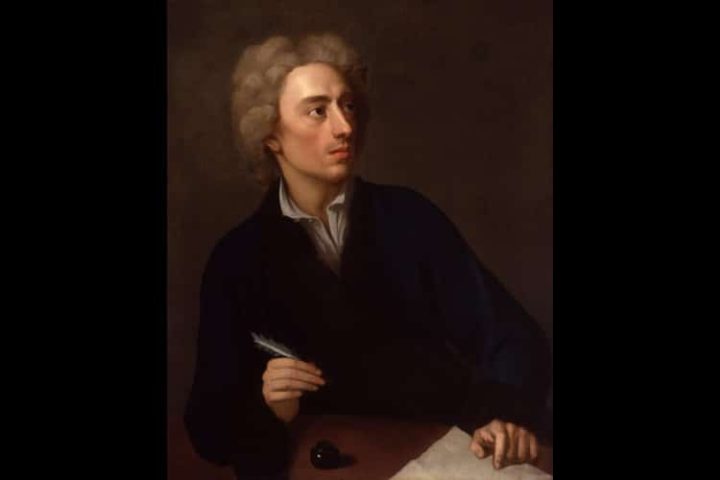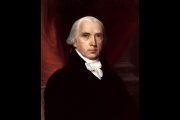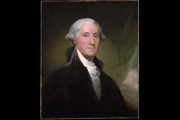
“Some people will not learn anything for this reason, because they understand everything too soon.”
Do you think there is value in reading the books our Founding Fathers read? Do you believe that when you come across a reference in something written by the Founding Fathers that you should look up that author or that book and investigate why one of the men who founded this union would quote that author or that book?
I believe there is great value in this act. I believe that if we read what our Founding Fathers read, we might do what our Founding Fathers did and rid our land of tyranny and restore republican government to the states and the people.
It is for that purpose that I write these little essays, these brief biographies of the men most often quoted by our Founding Fathers — men whose names are nearly completely unknown to contemporary Americans.
Today, I present to you another of those eminent though overlooked influences on our Founding Fathers: Alexander Pope.
To begin with, let me share with you a few of the places in the writings of the Founding Fathers where Alexander Pope is quoted: First, his work is quoted by Alexander Hamilton in The Federalist, No. 68; next, he is again quoted in “Federal Farmer” I (October 8, 1787); and, finally, in the letter known as “Solon, Junior” (August 9, 1788). These are but a few of the frequent mentions of the words of Alexander Pope in the writings of the Founding Generation. Now, for a short sketch of his life and work.
Alexander Pope (1688-1744) was a renowned English poet and satirist of the 18th century. Born in London, he overcame several physical limitations and emerged as one of the most influential literary figures of his time.
Pope was born into a Catholic family during a period of religious tension in England. Due to laws restricting the rights of Catholics, Pope faced social and political challenges throughout his life. Additionally, he suffered from poor health and was afflicted with a form of tuberculosis known as Pott’s disease, which stunted his growth and left him with a hunched back. These physical limitations likely colored his view of the world, and, as he himself expressed in many of his private letters, contributed to his satirical and often self-reflecting writing style.
Despite his physical ailments, Pope displayed a keen intellect and a love for literature from an early age. He began writing poetry as a teenager and quickly gained recognition for his wit and skill with words. His early works, such as “An Essay on Criticism” and “The Rape of the Lock,” established his reputation as a gifted poet. Pope’s writing often showcased his ability to blend sharp social commentary with elegant verse, making him a master of satire.
His other works in this genre include The Temple of Fame: A Vision; The Dunciad; The Prologue to the Satires; and The Court Ballad.
In addition to his satirical works, Pope was known for his translation of Homer’s Iliad and Odyssey. His translations brought these ancient epics to a wider audience, cementing his position as a leading and lasting light in the literary heavens. Pope’s translation of Homer not only demonstrated his poetic prowess but also his ability to negotiate and reinterpret classical texts for a contemporary audience.
As is the case with many of the people in his political and social circle, Pope’s literary success was not without controversy. His satirical targets often included prominent figures in politics, literature, and society, leading to both praise and condemnation. Despite facing criticism and occasional legal challenges, Pope remained steadfast in his commitment to exposing the follies and vices of his time through his writing.
Such steadfast adherence to his principles is yet another aspect of Pope’s life that would have endeared him to our Founding Fathers, men who pledged their “lives, fortunes, and sacred honor” to vouchsafe liberty to their posterity.
Throughout his life, Pope became a central figure in the literary circles of London. He corresponded with other leading writers and intellectuals of his era, including Jonathan Swift and Samuel Johnson. Pope’s personal relationships and his involvement in the literary community greatly influenced his work, further cementing his reputation as a literary giant.
Alexander Pope’s legacy as a poet and satirist endures to this day. His works continue to be studied and admired for their sharp wit, literary craftsmanship, and profound insights into human nature. Despite the physical and societal challenges he faced, Pope’s contributions to English literature remain as a testament to the power of words and the enduring impact of a skilled and insightful writer. Perhaps it was his ability to overcome his physical impediments and make a mark on his time and beyond that makes him such an enduring figure and one whose work many wise men have read and quoted.
For this article, I chose Pope’s Essay on Man, Epistle 1 as the source for some quotations that inspired not only the founding generation, but, if read, studied, and practiced today, could inspire our own time, as well.
First, it is interesting to note that Essay on Man, Epistle 1 is dedicated to Henry St. John, Lord Bolingbroke, another of the men most often-quoted by the Founding Fathers.
Regarding the danger of allowing vice to slowly increase in a society:
If white and black blend, soften, and unite
A thousand ways, is there no black or white? Ask your own heart, and nothing is so plain;
’Tis to mistake them, costs the time and pain.
Vice is a monster of so frightful mien,
As, to be hated, needs but to be seen;
Yet seen too oft, familiar with her face,
We first endure, then pity, then embrace.
Regarding the corruption that precedes the need for more and more written laws:
Mark what unvaried laws preserve each state, Laws wise as nature, and as fixed as fate.
In vain thy reason finer webs shall draw,
Entangle justice in her net of law,
And right, too rigid, harden into wrong….
Regarding the safety and happiness to be found in following natural law:
Who thus define it, say they more or less
Than this, that happiness is happiness?
Take Nature’s path, and mad opinions leave;
All states can reach it, and all heads conceive; Obvious her goods, in no extreme they dwell;
There needs but thinking right, and meaning well….
Regarding the relationship of riches to happiness:
Order is Heaven’s first law; and this confest,
Some are, and must be, greater than the rest,
More rich, more wise;
but who infers from hence That such are happier, shocks all common sense.
Finally, regarding the true definition of happiness:
Heaven to mankind impartial we confess,
If all are equal in their happiness:
But mutual wants this happiness increase;
All Nature’s difference keeps all Nature’s peace.
Condition, circumstance is not the thing;
Bliss is the same in subject or in king,
In who obtain defence, or who defend,
In him who is, or him who finds a friend.
The works of Alexander Pope, as well as the other men whose works I’ve featured in these articles, may be found for free on multiple websites. May we all take advantage of the blessing of having such treasures available so readily and read the works that inspired our Founding Fathers to know the true worth of freedom.



